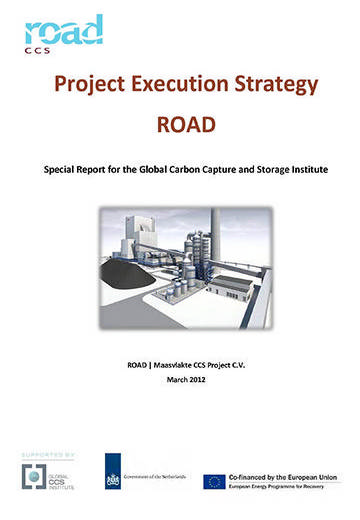Publications
Project execution strategy: ROAD. Special report for the Global Carbon Capture and Storage Institute
23rd March 2012
Topic(s): Business cases, Carbon capture use and storage (CCUS)
As the project approaches the key milestone of a decision on investment from its parent companies, this report aims to outline the future path of the project. An overview of upcoming milestones and a discussion on relevant activities and the project execution strategy is provided. Following the final investment decisions (FID), two consecutive organisations will be formed, the first focusing on design and construction up until 2015, whilst the second will focus on operation of the project between 2015 and 2020. The project employs skills of specialists from across both parent companies, with strategic partners playing a role throughout the development and operational phases of the project.
The project schedule is driven by both the MPP3 construction schedule and cost optimisation. In order to avoid MPP3 outage penalties, the tie-in works have to be executed on-track. ROAD focuses on cost optimisation and controlling. Both drivers led to the specific construction plan and the clustering of heavy lift components. The heavy lifting activities of large vessels and the main compressor are on the critical path. Thanks to the clustering of heavy lift components the cost and project schedule can be squeezed significantly. After the lifting and placement of these major components the capture plant can be assembled. In the second phase, the transport and storage works will become the major point of attention. From execution of the front end engineering and design (FEED) stage, a much more detailed state of engineering allowed ROAD to reduce uncertainties. The execution phase risks for construction, finance, scheduling, stakeholder engagement and permitting are addressed in this report. The risk mitigation actions progressively decreased the project contingencies. These contingencies represent the exposure due to volatile market prices, state of engineering detail, planning uncertainties and other issues. The FEED study reduced the total CAPEX contingency from 25 per cent (pre-FEED) to 10 per cent (post-FEED) of total CAPEX. The remaining key risks for the construction phase are the interfaces with MPP3, the timely signed EPC contract for the construction of the capture plant, and the CAPEX risk and commercial negotiations for the transport and storage chain. Furthermore, permitting and stakeholder management are points of attention. Objections or appeal on published permits from NGO’s or local organisations could result in scheduling issues.
The project budget is governed by the company’s organisational structure, with a budget split between project office and governance, stakeholder management, capture, and lastly, transport and storage. Budget is split over the life of the project into two phases: the design and construction phase (2010-2014), and the operational phase (2015-2019). Following the operational period, provisions have been made for plant decommissioning, and monitoring of the storage site. In ROADs probabilistic models the scheduling risk of FID postponement can also be visualised taking into account the probability of risks and defined mitigation actions. Please note that this report only highlights the key aspects of ROAD’s execution strategy.
Disclaimer
The content within the Global CCS Institute Publications, Reports and Research Library is provided for information purposes only. We make every effort and take reasonable care to keep the content of this section up-to-date and error-free. However, we make no claim as to its accuracy, currency or reliability.
Content and material featured within this section of our website includes reports and research published by third parties. The content and material may include opinions and recommendations of third parties that do not reflect those held by the Global CCS Institute.
